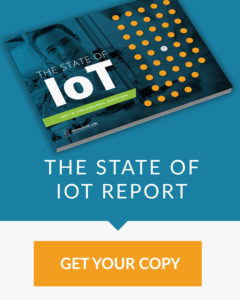The following is an excerpt from the State of IoT publication from the Indiana IoT Lab – Fishers. Download the report in its entirety at theStateOfIoT.com.
There is an interesting duality of talent in Indiana. On one hand, the entrepreneurial community and their financial supporters are primarily focused on software platform development, which is fortified by some recent and very successful exits. The epicenter of this entrepreneurial activity is Indianapolis. Meanwhile, the hardware community has enjoyed steady growth and success in a more rural environment, with manufacturing enterprises accounting for over a quarter of State GDP and over 500,000 jobs across a diversity of sectors, including medical devices, the defense industry, and automotive. Can we get the software and hardware folks in the same boat, rowing in the same direction?
When I attend an investor event in Indianapolis, there is inevitably a slide that shows a plethora of new brands related to software-focused startups. Alternatively, when I attend an economic advisory meeting, there is a slide that shows the old stalwarts of our Indiana economy, i.e. Eli Lilly, Zimmer Biomet, Cummins, Rolls-Royce, etc. Where are the manufacturing startups?
This may be the precise time for the software and hardware teams to join forces, crossing our geographical and entrepreneurial boundaries from rural Indiana to urban Indianapolis in a strategic effort to lead Industry 4.0 with software-enabled-hardware. The genesis of ideas may well come from our 50+ co-working spaces throughout the state, which can feed our new incubators, accelerators, and labs, like the new IoT Lab in Fishers.
But hardware, as they say, is hard. We need to recognize the differences and difficulties of funding and starting hardware companies if we plan to lead the transition from managed machines to thinking machines. To think, machines need data. Simply put, mechanical sensors that mimic our five senses and software that mimics our brains, all delivered at 5G. Will startups graduating from incubators, accelerators, and labs be in a position to start these new companies? Maybe, but there still exists a valley-of-death between producing a prototype and mass production of a regulatory approved product with customer demand. To cross this valley, it will likely take additional facilities, funding, and experiential education.
At Rose-Hulman, we are prospecting the idea of a Manufacturing Studio to address the facilities and educational gap, and reduce the funding hurtle. The studio concept follows the shared resources model of co-working spaces, accelerators, labs, etc. Not every manufacturing startup needs to hire a manager of manufacturing operations, lease a space, and buy a forklift. We can establish a space where these resources can be shared across many software-enabled-hardware startups to keep operating costs low while founders learn to capture customers, develop a supply chain, manage the regulatory approval process, and design/build their first assembly line. By tapping into our great educational institutions from around the state, we can provide founders with faculty support, interns, and co-ops to fulfill the multidisciplinary needs of a manufacturing enterprise.
A large-scale manufacturing studio could attract capital and founders from outside of Indiana, as they try to de-risk a hardware startup. After a 2-3 year residency in the studio, founders should have sufficient revenue to support their overhead as a standalone enterprise, taking with them a few well-trained co-ops and interns and an established supply chain.
Find out more – www.valleyhop.org or email Prof. Thomas James at james3@rose-hulman.edu.
 Arabic
Arabic Chinese
Chinese Dutch
Dutch French
French German
German Hindi
Hindi Italian
Italian Japanese
Japanese Korean
Korean Portuguese
Portuguese Russian
Russian Spanish
Spanish

